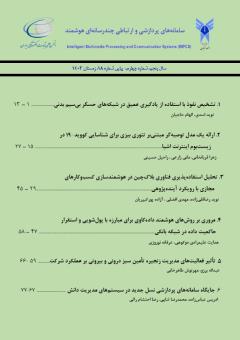جایگاه سامانه های پردازشی نسل جدید در سیستم های مدیریت دانش
محورهای موضوعی : پردازش چند رسانه ای، سیستمهای ارتباطی، سیستمهای هوشمندادریس عباس زاده 1 , محمدرضا ثنایی 2 * , رضا احتشام راثی 3
1 - 1. دانشجوی دکتری، مدیریت فناوری اطلاعات، واحد قزوین، دانشگاه آزاد اسلامی، قزوین، ایران
2 - استادیار، گروه مدیریت فناوری اطلاعات، واحد قزوین، دانشگاه آزاد اسلامی، قزوین، ایران
3 - استادیار، گروه مدیریت فناوری اطلاعات، واحد قزوین، دانشگاه آزاد اسلامی، قزوین، ایران.
کلید واژه: مدیریت دانش , تکنولوژی های هوشمند , کلان داده, بلاکچین, اینترنت اشیاء,
چکیده مقاله :
این پژوهش مجموعه مسائل مربوط به جایگاه تکنولوژیهای چندرسانه ای هوشمند در سیستمهای مدیریت دانش را برای آشنایی با نقش آن در مدیریت یک سازمان بررسی می نماید. این پژوهش مطالعه گسترده ای از ادبیات علمی، برای درک اینکه چگونه تکنولوژیهای چندرسانه ای هوشمند مانند به کارگیری بلاکچین یا استفاده از سیستمهای پردازشی و ارتباطی هوشمند جهت بهینه سازی دانش جدید، مدلهای جدید سازمان را توسعه میدهد، ارائه میکند. در این پژوهش تحلیل کتاب سنجی بر روی یک پایگاه داده، شامل 42 مقاله منتشرشده در سه دهه گذشته (2022-1990) انجام پذیرفت. نتایج نشان میدهد که تحقیقات منتشرشده در این زمینه، مفاهیم ارزندهای را در مورد مدلهای سازمان و عملکرد آن ارائه میکنند. این یافته ها نشان میدهد که به کارگیری تکنولوژیهای پردازشی و ارتباطی هوشمند در طولانی مدت به فرآیند خلق ارزش کمک میکند. این تحقیق به ادبیات موجود درحوزه مدیریت دانش با درنظرگرفتن آن از دیدگاه فرآیندی تکنولوژیهای چندرسانهای هوشمند و با اشاره به لزوم خلق و پیاده سازی دانش جدید و به اشتراک گذاشتن اقداماتی که باعث رشد جهانی و فراگیر پشتیبانی شود، کمک میکند.
Abstract
Introduction: This research examines the set of theoretical foundations related to smart multimedia technologies in knowledge management systems to learn about its role in managing an organization. This research provides an extensive study of scientific literature to understand how intelligent multimedia technologies such as the use of blockchain or the use of intelligent processing and communication systems to optimize new knowledge, develop new organization models.
Method: In this research, a bibliometric analysis was performed on a database, including 42 articles published in the last three decades (1990-2022).
Results: The results show that the researches published in this field provide valuable concepts about organization models and its performance. These findings show that the use of intelligent processing and communication technologies helps the value creation process in the long term. This research contributes to the existing literature in the field of knowledge management by considering it from the process point of view of smart multimedia technologies and by pointing to the need to implement new knowledge creation and share actions that support global and inclusive growth.This study analyzes the existing literature on KMS, with the aim of investigating the role of KMS in the era of digital transformation, especially in terms of organizational governance. The results showed that tools such as IoT and big data and blockchain can improve the current world economy by increasing the competitiveness of companies, guaranteeing access to big data and processed information through powerful software, developing correlation capacities between useful knowledge in the sector.
Discussion: There is still a lot of space to discuss the role of knowledge management systems in the framework of organizational governance and organization models towards innovative technologies, which remains limited. Our findings showed that big data has become a necessity for management, as it enables analysis of user preferences and spending trends and future market forecasting. More precisely, technological transformation and its tools provide a combined strategic solution that guides the operation of organizational governance. In this situation, the knowledge management system plays an important role in ensuring the optimization of technologies and resources, developing knowledge sharing strategies available to company employees, and supporting managers in their decision-making process.

